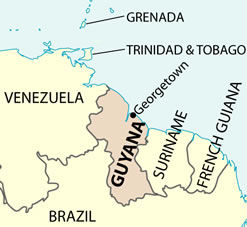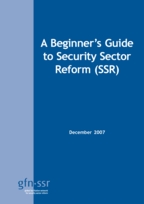Guyana Security Sector Reform Action Plan
At the height of the troubles in Guyana in 2002-2003, public safety came under the combined pressure of armed robberies, contraband-smuggling, gun-running, money-laundering, narcotics-trafficking, disappearances, kidnapping, massacres, prison escapes, death squads, drug gangs, arson, rural riots and trafficking in persons.
In light of the serious degeneration of the public safety situation, it was evident that something extraordinary had to be done to prepare the police force to face the challenges of crime and violence. In that crisis, the earliest efforts at security sector reform came from the administration itself. Back in 2002, President Bharrat Jagdeo personally promulgated a G$100M [about US$500,000] package and menu of measures to improve the police force’s crime-fighting capacity.
These reform measures included a complete review of the existing legislation on crime; comprehensive reform of intelligence-gathering, analysis and dissemination; improving the Criminal Investigation Department’s investigative and forensic capability; establishing a specialised training school where policemen would be exposed to modern methods of anti-crime tactics, and creating a special weapons and tactics team. Little was achieved on the local counter-crime plan, however, and thus the government resorted to seeking foreign assistance.
In response to the president’s specific request for security assistance, the British government sent the Defence Advisory Team (now SSDAT) to Georgetown in March 2003 to conduct a study of the security sector. The team subsequently produced a report recommending ways in which the police force’s capability could be enhanced.
That 2003 report, however, was not the first British study of the security sector. The Symonds Group Limited − consultants for the United Kingdom’s Department for International Development (DFID) − had released its report on the police force after reviewing it between October and November 2000. That report was aimed at helping the force’s senior management to determine the functions of an accountable, professional force, developing a community-based policing style and helping the government to identify the areas to strengthen performance, accountability and community orientation of the force. Unfortunately, many of the report’s recommendations were not implemented.
The police force itself established a Task Force on Organisation Change aimed at improving performance in information technology, public education and training in forensics and prosecution, among other things. This initiative failed to deal with security reform in a holistic manner and, having no special funding or full-time management team, its efforts were inadequate to transform the force in a significant way.
A new chapter in security sector reform opened the next year, 2005, with a meeting between President Jagdeo and Baroness Valerie Amos, the former Parliamentary Under-Secretary for Foreign and Commonwealth Affairs. In April 2006, the two agreed to a Statement of Principles which formed the basis on which DFID proceeded with a fresh consultancy. A new African Security Sector Network (ASSN) reform team, led by Professor Eboe Hutchful, moved the reform process forward in October and integrated various local and foreign initiatives into a holistic strategy. It was on the basis of that team’s report that British High Commissioner, Mr Fraser Wheeler, and the Head of the Presidential Secretariat and Secretary of the Guyana Defence Board, Dr Roger Luncheon, signed an Interim Memorandum of Understanding for a Security Sector Reform Action Plan in August 2007.
The action plan comprises the elements of strengthening policy-making across the security sector; building the police force’s operational capacity; mainstreaming financial management in the security sector into public sector financial management reform; creating substantial parliamentary and other oversight of the security sector; and building greater public participation and inclusiveness on security sector issues.
The British government has stipulated conditionalities in the memorandum of understanding, obliging the Guyana government to conform to established norms. For example, the administration was required to table in the National Assembly its summary action plan and motions to establish special select committees on the report of the locally-conducted Disciplined Forces Commission and to review the action plan’s implementation, among other things. The intention is that security sector reform in Guyana must eventually go far beyond the police force’s short-term needs and lay the foundation for a safe, secure and more humane society.
Traumatised by the Troubles on the East Coast of Demerara and elsewhere, Guyana and the police force can only benefit from the ongoing security sector reform process.
Written by David Granger, Brigadier (ret.)
Brigadier Granger is the Adjunct professor of National Security Affairs at the Center for Hemispheric Defense Studies of the National Defense University, Washington DC. He is also the Director of the Institute of Security and International Studies (Guyana) and is a former Commander of the Guyana Defence Force and National Security Adviser to the President.
For further information, please contact David Granger at isisyana@gmail.com.
Further Information
For further information on SSR in Guyana and the region, please visit the GFN-SSR Document Library and Organisations Directory.










